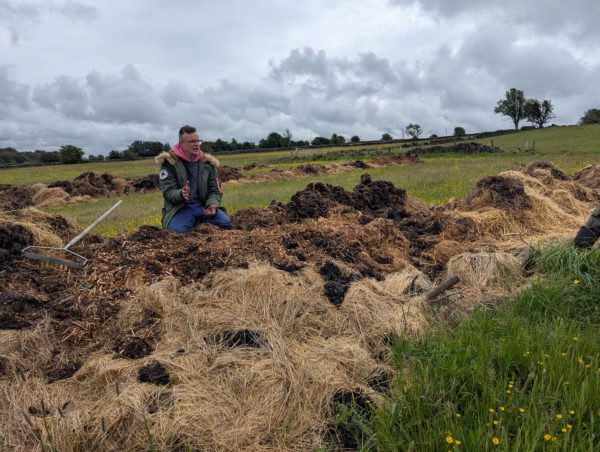Farm491 Visits RegenFutureCo – Farm491 Challenge Prize 2024 Winners
In June, Farm491 had the pleasure of visiting RegenFutureCo (previously RegenFarmCo), the Farm491 Challenge Prize 2024 winners, at their Nidderdale Farm. Hosted by the visionary Dr Vincent Walsh, the visit offered a deep dive into their bold and inspiring approach to regenerative agriculture.

Farm491 team member looks out over Nidderdale Farm
Perched at 250 metres above sea level, Nidderdale Farm spans a landscape with an 80-metre elevation range. Historically dominated by sheep grazing, the land has suffered from compaction, low biodiversity, and limited ecological functionality. With around 200 sheep managed by a dedicated livestock manager, the farm exemplified the challenges of traditional upland farming.
Dr. Walsh, drawing on his background in design and biological architecture, is leading a transformation rooted in ecological harmony. His vision is to create a multifunctional farm that integrates livestock, agroforestry, wildflower meadows and perennial cropping systems. Unlike the conventional focus on annual crops, Vincent is passionate about perennial foods, which offer more sustainable and resilient food systems.

Dr Vincent Walsh of RegenFarmCo
One of the farm’s advantages is that it hasn’t been sprayed with chemicals for over a decade. In contrast to neighbouring farms that rely heavily on nitrogen and phosphate inputs and maintain high sheep densities, Nidderdale Farm offers a cleaner slate for ecological restoration. This makes it an ideal testing ground for stacking biological functionality to achieve better economic and environmental outcomes. A key aspect of the project is decarbonization – exploring how regenerative practices can align with commercial goals and environmental stewardship.
Yorkshire Water has taken a keen interest in the initiative, particularly due to the farm’s proximity to a reservoir catchment area. The region faces flooding challenges, making hydrology a central concern. Understanding how water moves through and interacts with the landscape is critical not only for farming success but also for protecting downstream ecosystems.
The first year of the project focused on observation and baselining. Dr Walsh and his team conducted extensive surveys – tracking wildlife patterns, wind and sun exposure, frost pockets, and sheep behaviour. They employed penetrating radar, soil and carbon sampling, and bird surveys to build a comprehensive understanding of the land’s current state.
For Vincent, the foundation of any ecological system is water. This philosophy underscores the importance of managing water efficiently across the landscape to support all other life systems. The landscape here is unpredictable – alternating between periods of intense rainfall and prolonged dryness. To address this, the team has focused on designing a connected hydrological system that holds and distributes water efficiently across the land.
Rather than relying on isolated ponds, RegenFutureCo has created a network of water features—ponds, swales, and irrigation channels – that work together. These features are designed to retain water during wet periods and slowly release it during dry spells, ensuring year-round availability. This is especially important for their agroforestry zones and rotational grazing system, where consistent water access is essential.
The plan is to divide the farm into blocks, with sheep rotated through each block twice a year. To support this, every block needs its own water source. This eliminates the need for transporting water manually and ensures that livestock, crops, and wildlife all benefit from a stable water supply.
Dr Vincent Walsh explained how they used traditional A-frame tools to map the land’s natural contours. By following these lines, they built swales that hold water level across the slope. Overflow systems connect each swale to the next, allowing water to move gently across the landscape. This “slow, sink, and spread” approach helps prevent run-off and erosion while supplying the water where it is needed to support livestock, wildlife and cropping.
The farm’s soil profile – 30 cm of topsoil over two metres of clay – has been a hidden advantage. The clay acts as a natural liner, allowing water features to retain moisture without artificial materials. Over the past year, they have installed around 40 water features, which have already proven their value during recent dry spells and heavy rain events.
Beyond farming, these water systems are creating habitats for amphibians like frogs and newts, which in turn attract birds and other wildlife. The team is also developing a 10-acre wildflower meadow in partnership with the AONB and a seed donor. Scheduled for seeding in July, this meadow will support species like lapwings and curlews, whose nesting and feeding patterns have already been mapped.
Agroforestry and intercropping are also underway, supported by a circular economy approach. Composting, mulching, woodchip biomass, fungi cultivation, and worm colonies are all integrated into the farm’s nutrient cycles. These systems reduce waste and enhance soil health, supporting long-term productivity.

Dr Vincent Walsh demonstrates his vermiculture concept as part of the farm’s circular economy
RegenFutureCo is also becoming a hub for knowledge exchange. They regularly host researchers and organisations such as from the University of Bradford, Yorkshire Water, and local schools. These outreach efforts are a vital part of their mission – sharing insights, challenges, and successes to inspire others and contribute to a broader regenerative movement.
As the landscape evolves, so does the opportunity for research – especially around hydrology. RegenFutureCo is showing that with thoughtful design and ecological awareness, even the most challenging landscapes can be transformed into thriving, resilient ecosystems.
RegenFutureCo’s work at Nidderdale is more than a farm project – it’s a living laboratory for regenerative design. It challenges conventional practices and offers a blueprint for how we might farm in the future: in partnership with nature, informed by science, and driven by a deep respect for the land.
As Farm491 continues to support and learn from innovators like RegenFutureCo, we are reminded that the future of farming lies not just in technology, but in rethinking our relationship with the ecosystems we depend on.
Inspired? Be sure to check out the details for our Farm491 Challenge Prize 2025 when it launches here.
To find out more about RegenFutureCo, visit its website here.
